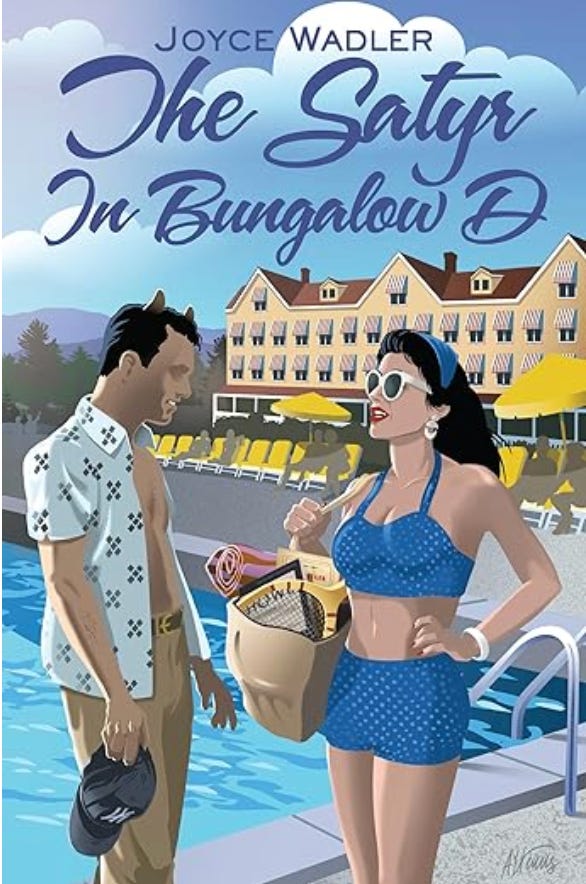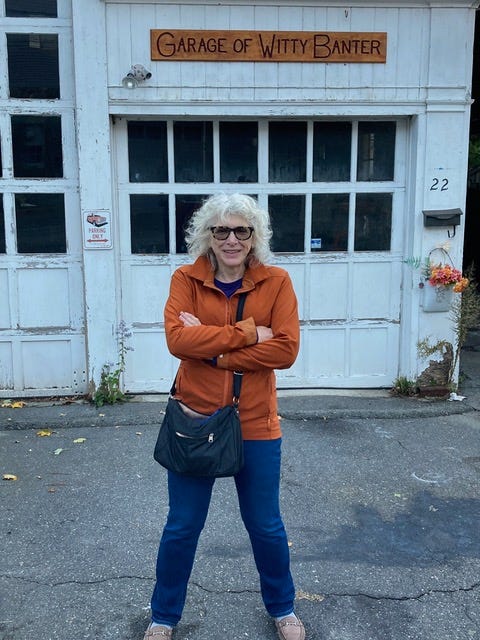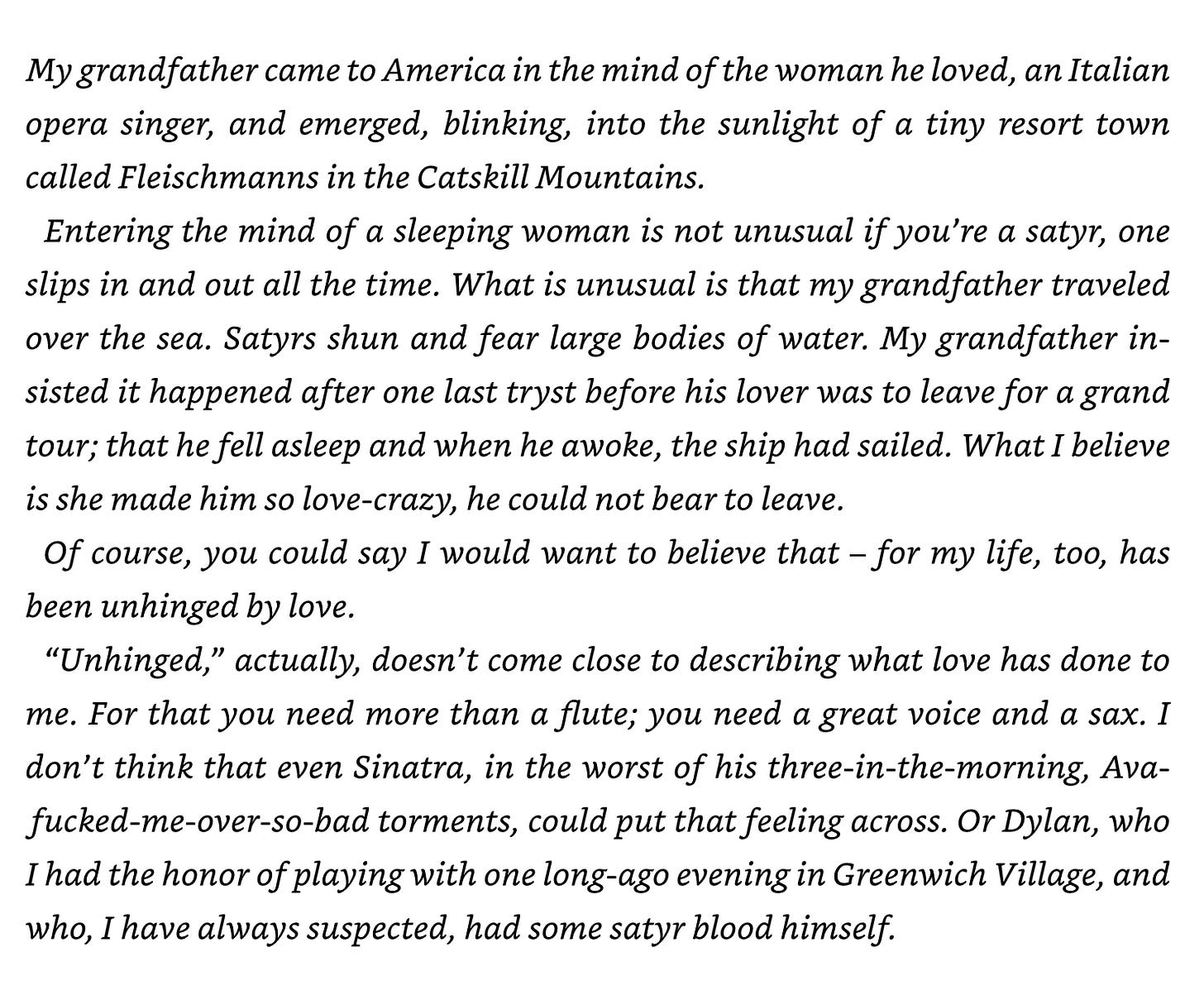Novelist, Humorist, and Journalist Joyce Wadler on Satyrs, the Catskills, and Her New Novel, The Satyr in Bungalow D
"The resorts in the Catskill Mountains are struggling in 1963, but the town of Fleischmanns has a secret that keeps the tourists coming back: A hidden colony of satyrs."
As a reporter for The New York Times and The Washington Post,
has written about everything from mob trials to the byzantine American healthcare system to Airbnb rules. Joyce has also been a contributing editor to Rolling Stone and New York, but she might be best known for her New York Times’ column, “I Was Misinformed,” which she wrote for many years.She is one of the funniest and most observant writers in the business (ref. her most recent Substack post, “Levon,” Says I to the Rock 'n Roll Legend, “Why Are You Doing This Interview in Your Underwear?”). Joyce is also a fiction writer, and her first novel, The Satyr in Bungalow D, was published on May 1.
Set mainly amid the lush summer landscape of the Catskills and populated with memorable characters, both human and satyr (including Bob Dylan, who, if not a satyr himself, certainly has satyr-like qualities), this novel is highly original (and funny), and it’s also poignant in ways I didn’t expect.
With summer and the high season in the Catskills approaching, I’ll leave you here with Joyce Wadler’s and my interview.
Bookish/Christine: A novel about a young satyr, Danny, who’s coming of age in a Catskills resort in the 1960s, is not a premise you see every day. How did this character and this story originate?
Joyce Wadler: I’d been thinking about this story for decades. When my agent was pitching this book, an editor said, “Oh, yeah, Joyce told me she wanted to write that.” That meeting was so long ago, I couldn’t remember it.
But yes, as you say, I grew up in the Catskills in the ‘50s and ‘60s, near a resort town called Fleischmanns, where my family had a small hotel. In the winter, the population was dairy farmers; in the summer, the town changed: it exploded with people from New York City. And sex. I think that’s typical of resort towns; people come looking for excitement and adventure, which often boils down to romance. You can pick up on it even if you are a little kid and don’t know what sex is.
Also, the Catskills, in summer, were wildly, painfully beautiful. I say painful because even as a little kid, I found them so beautiful I didn’t want to be alone in them; I wanted to be with someone who loved me. If you’re thinking that I sound a lot like Danny, the lovelorn satyr, you’re right.
This book is as much memoir as fiction, although I don’t think I figured that out till after I finished it.
After I grew up, my idea of the perfect date was being with someone you love, in a convertible, in summer, in the country. There’s a reason that in this book the satyr’s ritual greeting to a nymph they’re attracted to is, “It’s a beautiful afternoon in summer. Make it perfect. Be with me.”
But the exact idea for the book? Years ago, when I was in my early 40s, driving by myself to the country on a particularly gorgeous day, I was thinking how nice it would be to be with someone, and an image of a satyr, stepping out from the trees, popped into my head.
“Hello there, lady…”
Around the same summer, another image popped into my head: a group of middle-aged guys—warm, stocky, earthy, the type I like—sitting around my family’s hotel pool in the Catskills; playing cards, talking about women. But the guys are satyrs, covering their horns with hats and their hooves with socks and sandals—that was a look in the ‘50s. And the guys weren’t the main characters. The main character, who immediately made himself known, down to his name, was a young satyr with romantic problems, who comes running down to the pool to find his father.
The opening line was, “Danny always knew where to find Pop – around the pool with the other old goats.”
CS: Why do you think it took you so long to write it?
JW: I was working full time as a reporter and that took up a lot of energy. But I think I was also intimidated. I was a newspaper and magazine feature writer, I thought I was a good writer, but I put novelists on a higher level—I wasn’t sure I could do it. I also wasn’t sure what the story was or how to tell it.
But I also couldn’t get Danny and the Catskills in its dying resort days out of my head; it kept nagging at me, which is a sign of a story that wants to be told. I could see I would get no peace until I wrote it. So, during COVID, when I had nothing but time, I did. This time, it only took a day or two to realize how Danny’s story should be told and find the tone.
CS: The Great Gatsby is Danny’s favorite book, and when he falls for a woman named Diane (instead of one of the capricious nymphs who show up every spring in the woods where he lives), he can’t help but see himself as the lovelorn Gatsby pining for Daisy. Was Fitzgerald's most famous novel an inspiration from the beginning?
JW: No. Gatsby probably popped into my head because it’s my favorite novel. I read it at least once a year, I think it’s a perfect novel. I had Danny find a copy in which the last chapters have been ruined in a rainstorm, so he doesn’t know the ending. Danny thinks, because Gatsby’s love is so strong, the story will of course end with Gatsby and Daisy together. That’s both funny, because it’s so ill-informed, and heartbreaking. Daisy was never going to leave her husband for Gatsby; Gatsby ends up dead.
Danny lives in the woods, there’s a lot he doesn’t know about human culture. He also takes what he reads literally. When Henry Miller writes that he has a six-inch bone in his penis, Danny believes that and assumes it’s true of all humans. He does not know from metaphor.
CS: You’re a very funny writer. I think it's accurate to classify The Satyr in Bungalow D as a sex comedy. Would you also call it a satire? Danny isn't the typical satyr, for one—he's not ready to hop on the nearest, willing nymph—unlike his father or his best friend Ben.
JW: I don’t think of it as satire. There’s a new category of fiction called romantasy, a combination of romance and fantasy - that would be a great classification for this novel, because it’s selling a lot of books. But to me, Satyr is a comic novel about a guy looking for love. A guy with horns, but that doesn’t matter. It’s a love story.
***
Excerpt from opening of The Satyr in Bungalow D:
Joyce’s previous books: My Breast, One Woman’s Cancer Story; Liaison, The Gripping Real Story of the Diplomat Spy and the Chinese Opera Star Whose Affair Inspired “M. Butterfly”; and Cured, My Ovarian Cancer Story








Love Joyce's work - and yours! Thanks, Christine.
This book sounds amazing! Can't wait to check it out.